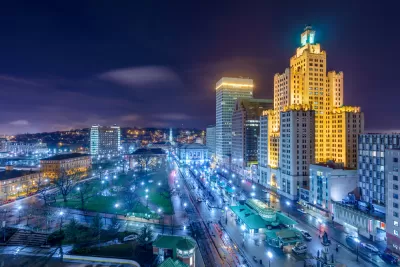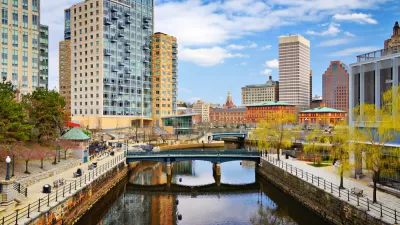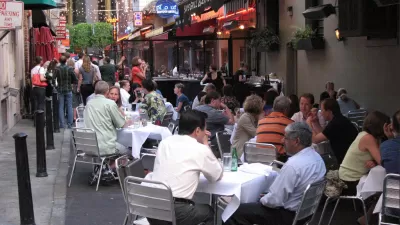Providence, Rhode Island is looking ways to make Kennedy Plaza, located in the city's downtown, safe for all users. Increased law enforcement in only one way to achieve that goal, according to an op-ed in the Providence Journal.

"[Providence's] Kennedy Plaza has received a lot of attention lately — most of it focused on disturbances, panhandling and bad behavior," according to a column by Cliff Wood, executive director of the Downtown Providence Parks Conservancy (DPPC).
Wood shifts the focus of the conversation about the state of Kennedy Plaza, first by reminding readers of the importance of public space: "Public spaces are integral to the health and vitality of our city, and keeping them clean and safe is essential for all of its citizens."
After Wood lists the many partnerships his organization is working with to improve and maintain the parks in downtown Providence, Wood explains the importance of programming to his mission:
One of the most important principles of place-making, and one of our core beliefs at the DPPC, is that the best way to transform a space is by transforming the way people use it.
Wood's op-ed is written as a response to recent news of increased law enforcement presence in Kennedy Plaza, including a news article from early September by Amanda Milkovits. Although Woods recognizes the importance of law enforcement in keeping public spaces safe, "ultimately the best way to keep a public space free of negative activity is to fill it with positive activity."
FULL STORY: Cliff Wood: Good things happening in Kennedy Plaza

Planetizen Federal Action Tracker
A weekly monitor of how Trump’s orders and actions are impacting planners and planning in America.

Map: Where Senate Republicans Want to Sell Your Public Lands
For public land advocates, the Senate Republicans’ proposal to sell millions of acres of public land in the West is “the biggest fight of their careers.”

Restaurant Patios Were a Pandemic Win — Why Were They so Hard to Keep?
Social distancing requirements and changes in travel patterns prompted cities to pilot new uses for street and sidewalk space. Then it got complicated.

Platform Pilsner: Vancouver Transit Agency Releases... a Beer?
TransLink will receive a portion of every sale of the four-pack.

Toronto Weighs Cheaper Transit, Parking Hikes for Major Events
Special event rates would take effect during large festivals, sports games and concerts to ‘discourage driving, manage congestion and free up space for transit.”

Berlin to Consider Car-Free Zone Larger Than Manhattan
The area bound by the 22-mile Ringbahn would still allow 12 uses of a private automobile per year per person, and several other exemptions.
Urban Design for Planners 1: Software Tools
This six-course series explores essential urban design concepts using open source software and equips planners with the tools they need to participate fully in the urban design process.
Planning for Universal Design
Learn the tools for implementing Universal Design in planning regulations.
Heyer Gruel & Associates PA
JM Goldson LLC
Custer County Colorado
City of Camden Redevelopment Agency
City of Astoria
Transportation Research & Education Center (TREC) at Portland State University
Camden Redevelopment Agency
City of Claremont
Municipality of Princeton (NJ)




























